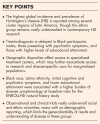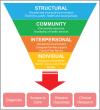Disparities in Huntington's disease care and research
- PMID: 40395201
- PMCID: PMC12237127
- DOI: 10.1097/WCO.0000000000001376
Disparities in Huntington's disease care and research
Abstract
Purpose of review: Disparities in care and outcomes are well described in common neurologic disorders; however, less is known about disparities in rare diseases such as Huntington's disease (HD). This review summarizes HD epidemiology in the US and globally while highlighting disparities in HD diagnosis and outcomes across various HD groups. The review also discusses how the lack of diversity in HD research threatens the validity of clinical trials and raises concerns about global accessibility to emerging therapies.
Recent findings: Global HD prevalence and incidence vary worldwide, though the highest numbers are reported in Latin American cluster regions. Within North America, there are disparities in diagnosis and outcomes among Black and Latino patients. Socioeconomic status, educational attainment, and sex were also associated with differences in diagnosis, access, and outcomes. Many of the recent studies in this review used the ENROLL-HD longitudinal study. Yet, the dataset is 90% White Non-Hispanic, leading to an incomplete understanding of how HD manifests in diverse groups.
Summary: Racial, sex, and socioeconomic disparities exist in HD care and research. Addressing these disparities is imperative in improving access to HD care, clinical trial participation, and disease-specific outcomes for all patients with HD in the US and worldwide.
Keywords: Huntington's disease; access to research; health services; healthcare disparities.
Copyright © 2025 The Author(s). Published by Wolters Kluwer Health, Inc.
Conflict of interest statement
Figures
References
Publication types
MeSH terms
LinkOut - more resources
Full Text Sources
Medical
Research Materials



